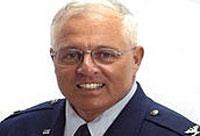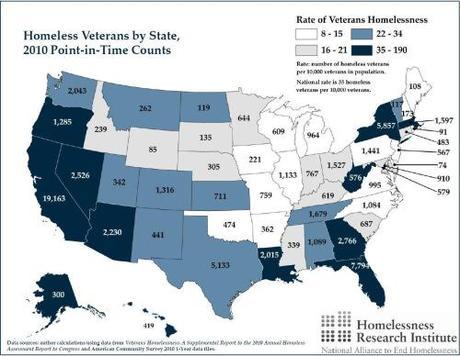
There is an epidemic of homelessness and joblessness among our military veterans. Shameful!
The Philadelphia Inquirer reports (via military.com), Jan. 6, 2014, that as of January 2012, more than 60,000 veterans were homeless, according to the Department of Veterans Affairs. Reducing that number supposedly is a priority for the Obama administration. Although the number of homeless veterans dropped 24% nationwide from 2009 to 2013, Pennsylvania is an exception where the number actually increased 46%, to more than 1,400.
Our veterans’ homelessness is partly because of joblessness. A monthly lunch in Washington, D.C. attracts about 200 veterans. After they eat, the men and women who are unemployed stand up one by one to recite their service records, hoping someone else in the room will hire them. Many are highly accomplished.

One of the homeless and jobless veterans is 59-year-old Robert Freniere, a former colonel in the U.S. Air Force who retired in 2006 after braving multiple combat zones. (pic left)
After a 30-year military career in which he earned three graduate degrees, rose to the rank of colonel, and served as an aide to Pentagon brass, Freniere is unemployed and lives out of his blue minivan crammed with all his possessions and held together with duct tape.
He’d even tried getting a job as a janitor. But his plea for help to a janitor he once had praised when the man was mopping the floors of his Washington office, went unfulfilled. So have dozens of job applications that he’d filled out six hours a day, day after day, on public library computers.
How does he cope?
Freniere told the Philadelpia Inquirer, “You stay calm. That’s what we were trained for when I went through survival training.”
Last month, Freniere teared up as he asked for advice on finding a paycheck from Adm. James Hogg, who had officiated at Freniere’s retirement ceremony in 2006 and hailed him as “a leading light.”
In an interview, Hogg described Freniere as “very smart” with “the gift of gab” and thought it “crazy” that the vet is jobless. “With all his experience, especially in intelligence, there’s got to be a spot for him.”
But jobs are hard to come by. Freniere, like many of his fellow down-on-their-luck veterans, does not match any hat-in-hand Hollywood image of homelessness. He receives an annual pension from the military of more than $40,000.
His struggle to find a job after retiring from the Air Force collided with the end of his marriage nearly two years ago. Unable to return to the home he shared with his estranged wife, and faced with expenses including bills for two sons in college and debts that mounted in his former a nicer lifestyle, he took up a nomadic existence. Between spells on the couches of friends in multiple states, he sleeps occasionally in motels and other times in the dented blue van.

The Philadelphia Inquirer veried the bulk of Freniere’s story, which is confirmed by military records. His is a story of service.
Born in 1954, Freniere was an Eagle Scout and joined the Army in 1976, and later the Air Force as an intelligence officer. As he moved through the ranks, he served in combat zones in Somalia, Panama, Haiti, and Kuwait, earned master’s degrees in political science and criminal justice at the University of Cincinnati and a master’s in national security and strategic studies from the Naval War College.
Freniere moved to the Pentagon in 2000 and was there when it was hit by terrorists Sept. 11, 2001. Two years later, he became special assistant to Gen. Stanley McChrystal, then the vice director of operations of the Joint Staff.
In 2005, Freniere volunteered to go to Iraq. But as he was preparing to deploy, his legs went numb one day, followed by back surgery. Instead of flying to Iraq, he spent a year and a half convalescing. In 2006, he retired from the Air Force.
After his retirement, it took him a year to find work. Like many retired servicemen, he turned to jobs with defense contractors which took him twice to Afghanistan. When he came home, he had nowhere to go after separating from his second wife.
Freniere said he had not been able to find a contracting job since August 2012 and blames the federal sequestration for squeezing contractors of money and of the confidence to hire people.
Freniere’s dyslexia makes focusing on a computer screen difficult. Online applications are so hard for him that tears well in his eyes as he describes his days at public libraries.
But Freniere said that he had not lost hope: “I’m a military guy. I’m mission-oriented. You don’t give up. I’ve got a lot of good experience. I’ve got two beautiful sons. I’ve got a van. I don’t know how long it’s going to hold up, but I’ve got it. I’ve got a lot of things to be thankful for.”
See also “Democrats cut military pensions in favor of tax credits for illegals,” Jan. 14, 2014.
~Eowyn

